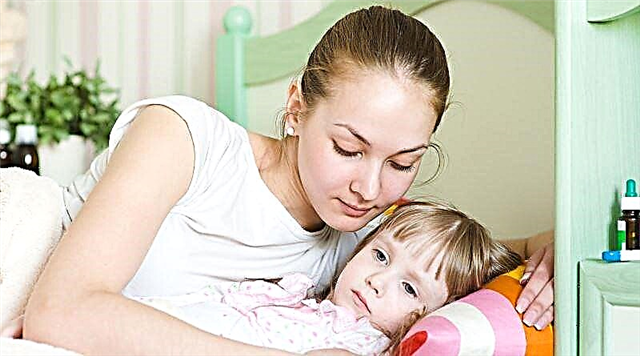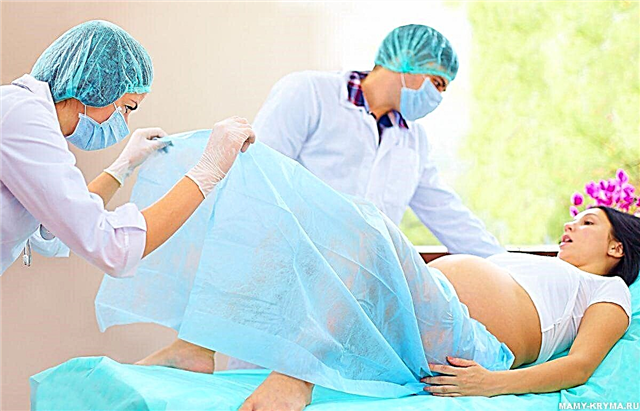
Everyone knows that diseases, popularly called colds, are dangerous during pregnancy. But rarely does a woman manage to make a journey of nine months without illness at all. And therefore, the question often arises of what to do and what to treat if ARVI or flu overtook the expectant mother in the final, third trimester of pregnancy.
Is there a danger?
When we talk about colds, we usually mean viral infections that are widespread. Respiratory viruses usually enter the body through the nose or mouth, causing inflammation along the way, which causes the symptoms - runny nose, sore throat, cough. The temperature rises as a protective reaction, because the production of protective antibodies is activated during the heat.
Viral infections for pregnant women are dangerous both by themselves and by their possible complications, including pneumonia, meningitis, bronchitis and other unpleasant diagnoses. The virus can lead to multiple fetal malformations during the period when the baby's organs and systems are being actively formed, that is, in the first trimester. Somewhat later, influenza and ARVI can cause disturbances in the work of the placenta.
By the third trimester, the child is fully formed, he is only gaining weight and growing, his nervous system is improving. And therefore, the mother's illness is no longer so dangerous for him, it will not lead to developmental defects for sure. But, of course, there is nothing pleasant in such an illness.

By the final third of the gestation period in women, immunity is extremely depleted, and therefore the disease during this period is not at all uncommon. It is much more difficult for a woman to endure the symptoms of the disease in late pregnancy than in a non-pregnant state. If the disease occurs immediately before childbirth, a woman has a very real chance of getting into the observational department of the maternity hospital, where women with infections and unexamined patients are lying.
Despite the fact that viral diseases do not carry great danger in the third trimester, a woman should take the disease seriously, because possible complications can affect her own internal organs - there may be impaired renal function, the heart muscle, the brain may be affected, and such conditions will require aggressive drug treatment. And although the list of drugs allowed for use in the third trimester has been expanded compared to early gestation periods, heavy and serious antibiotic therapy will not bring benefits to the baby.

The main danger of the disease in the third trimester lies in the possibility of developing fetoplacental insufficiency, premature aging of the placenta, and therefore the baby will begin to receive less nutrients and oxygen than he needs at the current time.
Influenza and SARS significantly increase the risk of preterm birth.
How to treat?
If characteristic symptoms appear - a sore throat, a stuffy nose, a cough and a rise in body temperature, during pregnancy it is strictly forbidden to try to treat this condition on your own. Be sure to call a doctor at home. To do this, it is enough to call the clinic and register a call to the house of the local therapist. A woman must be examined by a specialist, because under the clinical signs of a cold, both a viral illness and a bacterial infection can be covered, and the treatment in these two cases will be completely different.
You do not need to go to the clinic on your own, the woman is shown strict bed rest from the first hours of the manifestation of the disease - in this state, she should wait for the doctor from the clinic.

The appearance of such signs as a runny nose, sore throat, pain when swallowing, cough, fever, are a good reason for inviting a doctor to your home, especially when it comes to the expectant mother.
Despite the fact that in the 3rd trimester the strictest ban on taking many medications is lifted, It is not worth prescribing nasal drops or tablets on your own on your own - as before, each drug must be agreed with the doctor.
If a bacterial infection is detected, antibiotic treatment is prescribed. In the final third of the gestation period, antibacterial drugs of the penicillin group, cephalosporin antibiotics and macrolides are acceptable, if necessary. Only ototoxic antibiotics (neomycin and gentamicin) are not prescribed, since they can cause deafness in the child and the occurrence of hearing problems in the mother herself. Quinolones and sulfonamides are also banned. But now, in contrast to the early stages, many broad-spectrum antibiotics are acceptable.

In most cases, with the symptoms described above, the doctor ascertains a viral disease. It does not in any way need any antibiotics, because viruses are insensitive to antibacterial agents. As for antiviral drugs, there are not so many drugs with proven efficacy - these are several types of influenza drugs that are not advertised. They are injected in a hospital in case of severe flu and during pregnancy they are prohibited at any time.
For home treatment, the doctor may recommend Anaferon, Otsillococcinum, Viburkol, Viferon and other remedies. Whether to use them or not is up to the patient herself. Most of these remedies are homeopathic, they contain extremely small doses of certain substances in a decimal dilution, clinical trials have not revealed any effectiveness. This means that with and without such a remedy, the disease will last exactly as long as it takes a woman's immunity to take control of the situation and develop enough antibodies to fight the invading virus. If you do not want to take pills or syrups once again, you can refuse antiviral drugs without remorse, the benefits of which are very doubtful.
Treatment of colds (read - SARS or flu), in the third trimester, can be extremely symptomatic, that is, aimed at getting rid of certain symptoms.
Allowed funds
With a sore throat in the third trimester of pregnancy, a woman can use agents for local anesthesia and reduce the focus of inflammation, for example, STOPangin spray, and such local remedies as Tantum Verde and Geksoral are not contraindicated. When using these sprays and aerosols, it is important to remember that it is not worth eating and drinking immediately after irrigating the throat, wait 1.5 hours. Also, do not apply the product immediately after eating.
It is allowed to use lozenges for resorption, such as "Lizobact" and "Faringosept", but it is better to refuse pharmaceutical lozenges for sucking with eucalyptus, honey and other components, since they often contain dyes and preservatives.
If the cough is dry and unproductive, expectorants are prescribed, for example "Mukaltin", "Eukabal", inhalation is recommended. With a wet cough, you can not take anything, but only pay attention to an abundant warm drink, which will facilitate the discharge of sputum.

With a runny nose, if there are no other symptoms, you should not drip anything into the nose, since a runny nose before childbirth is physiological, associated with a slight swelling of the mucous membranes. With a cold, "complete" with which other symptoms of the disease come, drops with a vasoconstrictor effect are contraindicated. They constrict not only the vessels of the nasal passages, but also other vessels in the body, including the vessels of the placenta. On the other hand, preparations based on a saline solution are allowed - "Aquamaris", "Marimer", as well as preparations from raw materials of plant origin, for example, "Pinosol", "Dolphin".
At high temperatures, it is imperative to reduce it, since the heat negatively affects the state of the uteroplacental blood flow. Until the thermometer has exceeded 38.0 degrees, there is no need to take antipyretics - a high temperature is necessary for the immune system to more effectively fight the virus.
But the fever above 38.0 degrees already needs to be reduced - it is recommended to use only paracetamol-based preparations for this. Aspirin is prohibited for pregnant women.
Recommendations
A woman who fell ill in the last weeks of her pregnancy needs rest and bed rest - the body does not have much strength to quickly resist the infection, and attempts to move and actively do something can lead to serious complications.
Do not wrap yourself up if you have a temperature. A minimum of clothes and a sheet is the best way to establish thermoregulation and prevent overheating of the body.

A woman should be in a well-ventilated area, and during the day, you need to open the window at any time of the year and ventilate it several times. It is necessary for someone from the household to do wet cleaning and start actively humidifying the air in the room - the drier the air is, the higher the likelihood that the mucous membranes of the respiratory system will dry out and a complication will develop.
Humidifying the air is very simple - if there is no humidifier, you just need to hang wet towels or diapers on the heating radiators. When dry, they will release moisture to the air.
Drinking plenty of fluids is necessary, but the exact volume of fluid should be agreed with the doctor - with gestosis and edema, a large amount of fluid is contraindicated. If the pregnancy is proceeding without pathologies, you can drink up to 2.5 liters of fluid per day. Drinks should not be hot or cold, preferably at room temperature. Drinking too hot can cause additional swelling of the throat if it is already sore and inflamed.

Drink still water, homemade juices, fruit drinks, comfort from dried fruits with a minimum sugar content. You should not drink black tea, as it contains caffeine, a substance that is dangerous at any stage of pregnancy.
If the symptoms of the disease persist after 6-7 days, you should consult a doctor again. It is possible that complications have appeared.
Folk remedies to help the expectant mother
Even folk remedies for treatment during pregnancy must be agreed with a doctor, because plant substances are by no means as safe as it is believed.
To reduce the intensity of dry cough, to quickly remove phlegm will help green tea with the addition of a small amount of a decoction of pharmacy chamomile. It can also be used to gargle and rinse your nose. If a woman is not allergic to honey, you can take a spoonful of honey 2-3 times a day with plenty of warm liquid. But it must be remembered that foods with a high allergenicity index are dangerous from the point of view of the development of allergies in a child after birth, so it is better not to overdo it with honey, even with excellent tolerance of the product.

Vitamin C, on which all sick people are so heavy, does not affect the virus and recovery, so there is no need to choke on sour lemons if a woman does not like them. In addition, citrus fruits are also foods with a high allergenic status. You can drip aloe juice into the nose, previously diluted with half of water.
In the third trimester, as in any other, it is important to avoid plants such as coltsfoot, ginseng, and echinacea. Also, do not rub with alcohol or ice water at a temperature, do inhalations in high heat, rub with fat, soar your feet and pour mustard into woolen socks.
How to protect yourself from illness?
In fact, it is quite difficult to avoid illness in the final trimester - the body has reached critical overloads, the immune system is depleted. Therefore, it is important to pay special attention to prevention.
- Visit crowded places, shopping centers, public transport during peak hours less often - this is where infectious diseases are most often infected.
- If there is no urgent need, stop going to clinics and hospitals during the seasons when the incidence of SARS and influenza naturally increases.
- Help your immune system - eat more fresh vegetables and fruits, take multivitamins if necessary, do not neglect meat, fish, foods that are rich in animal protein.
- Try to limit contact with sick people, even if they are close relatives. If this is not possible (for example, an older child is ill, and the grandmother cannot sit with him), use gauze bandages, change them every 2-3 hours, lubricate the nostrils with "Oxolinic ointment".
- It is best to get a flu shot at the very beginning of pregnancy, but if this was not done, contact the clinic during the vaccination period at any time - the vaccine will help reduce the likelihood of complications, even if the flu does occur.

Moderate but obligatory physical activity, walks in the fresh air, gymnastics will help to avoid illnesses in the late stages.
All these measures contribute to the maintenance of immunity in an efficient state even while carrying a child.
About how and what to treat ARVI during pregnancy, Dr. Komarovsky answers in the next video.



